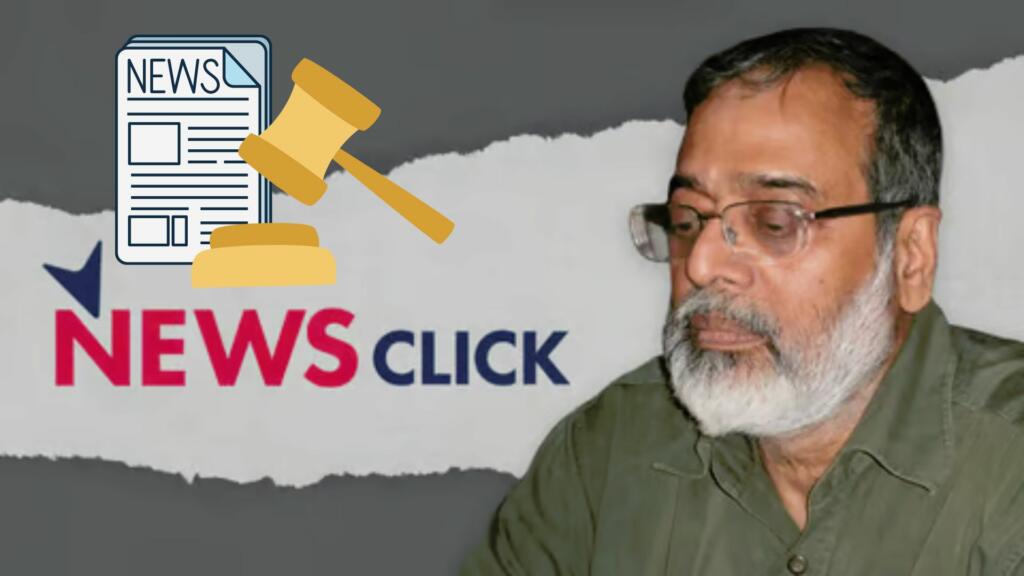The recent chargesheet filed by the Delhi Police against news portal Newsclick has sparked debates surrounding freedom of speech and national security in India. The allegations of pro-China propaganda and illegal foreign funding have raised serious concerns about the role of media in shaping public opinion and the boundaries of journalistic integrity. As the case unfolds, it becomes imperative to examine the various dimensions at play and understand the implications for both the media landscape and democratic values in the country.
Accusations on Newsclick
At the heart of the matter lies the accusation that Newsclick received significant funds for promoting pro-China narratives, thereby compromising its journalistic independence and potentially posing a threat to India’s sovereignty and security. The invocation of the Unlawful Activities (Prevention) Act, 1967 (UAPA) underscores the gravity of the charges, as this law is primarily aimed at combating terrorism and activities perceived to be detrimental to the nation’s interests. By framing the case within the context of national security, the authorities are sending a clear message about the severity of the alleged offenses.
However, amidst the legal proceedings and allegations, it is essential to uphold the principles of due process and fair trial. The presumption of innocence must prevail until proven guilty, and the accused individuals have the right to defend themselves in a court of law. Moreover, the burden of proof lies with the prosecution to substantiate its claims beyond a reasonable doubt. Any deviation from these fundamental principles would undermine the credibility of the judicial system and erode public trust in the administration of justice.
The Balance of Regulations & Article 19
The case raises broader questions about the regulation of media and the delicate balance between freedom of expression and national security interests. While the freedom of the press is enshrined in the Indian Constitution as a fundamental right, it is not absolute and must be exercised responsibly. Journalists have a duty to adhere to professional ethics and standards of impartiality, ensuring that their reporting is accurate, fair, and devoid of any undue influence or bias. Any attempt to manipulate public opinion or disseminate false information undermines the integrity of the media and threatens the fabric of democracy.
Also Read: India’s Electronics Surge Sends Shockwaves to China
Journalistic Approach or Illegal Actions
Well, it is crucial to distinguish between legitimate journalistic practices and unlawful activities. Investigative journalism often involves uncovering uncomfortable truths and challenging the status quo, which may occasionally ruffle feathers and draw criticism from those in power. However, such scrutiny is essential for holding the government and other institutions accountable and fostering transparency in governance. The case against Newsclick should not be seen as an indictment of the entire media fraternity but rather as an isolated incident that warrants thorough investigation and appropriate action.
The Role of Foreign Funding
The role of foreign funding in shaping media narratives adds another layer of complexity to the issue. While financial support from international sources is not inherently nefarious, it raises concerns about external influences and potential agendas. In an era of globalization, media organizations operate in a globalized environment where information flows across borders seamlessly. However, this interconnectedness also opens the door to foreign interference and propaganda, posing challenges for governments in safeguarding national interests without stifling legitimate dissent and diversity of opinions.
In light of these complexities, it is essential for policymakers to strike a delicate balance between protecting national security and upholding democratic principles. Any measures taken to regulate the media must be guided by the principles of proportionality, necessity, and respect for human rights. Blanket restrictions and draconian laws that curtail freedom of expression can have chilling effects on dissent and stifle pluralism, ultimately undermining the foundations of democracy.
In conclusion, the Newsclick case underscores the intricate interplay between media freedom, national security, and democratic values in India. While the allegations against the news portal are serious and warrant a thorough investigation, it is imperative to ensure that the legal process is fair, transparent, and in accordance with the principles of justice. Moving forward, policymakers, media practitioners, and civil society must engage in constructive dialogue to address the underlying issues and uphold the integrity of the media as a cornerstone of democracy. Only through such collective efforts can India navigate the challenges of the digital age while safeguarding its core values and principles.
Also Read: India-China Border Dispute and the Path to Resolution: Pursuing Peace?
